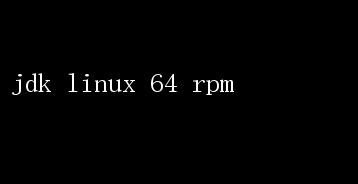JDK 64位Linux RPM安装指南
jdk linux 64 rpm
作者:IIS7AI 时间:2024-12-31 05:56

JDK for Linux 64-bit RPM: A Comprehensive Guide for Developers In the realm of software development, the Java DevelopmentKit (JDK) stands as a cornerstone for creating robust, scalable, and portable Java applications. As the technology landscape evolves, ensuring compatibility and performance across diverse platforms becomes increasingly crucial. This is especially true in the case of Linux, a versatile operating system favored by developers worldwide for its stability, security, and flexibility. In this article, we will delve into the specifics of installing and utilizing the JDK for Linux 64-bit RPM packages, highlighting its benefits, installation procedures, and best practices to maximize your development experience. Understanding the Importance of JDK on Linux Linux has been a staple in the development community due to its robust nature and extensive support for open-source technologies. With the rise of cloud computing and microservices, Java, being platform-independent and highly scalable, has emerged as a go-to language for building enterprise-grade applications. The JDK, therefore, serves as the indispensable toolkit for Java developers, providing them with the compilers, debuggers, and other necessary tools to write, compile, and debug Java code. Choosing the right JDK version and package format for your Linux distribution is paramount. The RPM(Red Hat PackageManager) format is widely used in various Linux distributions, such as CentOS, Fedora, RHEL(Red Hat EnterpriseLinux), and others based on the RPM Package Manager. The 64-bit version of these packages ensures compatibility with modern hardware architectures, offering optimal performance and memory utilization. Benefits of Using JDK RPM Packages on Linux 64-bit 1.Ease of Installation and Management: The RPM package manager simplifies the installation, upgrading, and removal of software packages. It handles dependencies automatically, reducing the likelihood of encountering missing library issues or version conflicts. 2.Consistency and Reliability: RPM packages are curated and tested to ensure they adhere to specific quality standards. This ensures that the JDK you install is reliable and stable, minimizing the risk of runtime errors or performance issues. 3.System Integration: RPM packages integrate seamlessly with the Linux system, providing access to system-wide configurations and updates through the package manager. This allows for easier integration with other system tools and libraries. 4.Security: The RPM format supports digital signatures, which verify the authenticity and integrity of the packages. This is crucial for securing your development environment against potential vulnerabilities and malicious software. 5.Compatibility: By installing the JDK via RPM, you ensure compatibility with other software that relies on specific JDK versions or configurations. This is particularly important in multi-tier application environments or when deploying Java applications on servers. Installing JDK RPM on Linux 64-bit Before proceeding with the installation, ensure you have administrative privileges on your system. The following steps outline the general process for installing a JDK RPM package. Note that specific package names and URLs may vary depending on the JDK version and Linux distribution you are using. 1.Download the JDK RPM Package: Visit Oracles official website or adoptOpenJDK, an open-source project, to download the JDK RPM package for your desired version. Ensure you select the appropriate package for your Linux distribution andarchitecture (64-bit). bash wget https://download.oracle.com/java/latest/jdk-xxx_linux-x64_bin.rpm Or for AdoptOpenJDK wget https://github.com/AdoptOpenJDK/openjdk11-binaries/releases/download/jdk-11.x.x%2Bxx/OpenJDK11U-jdk_x64_linux_hotspot_xx.x.x_1_rpm.bin 2.Prepare the Package (if necessary): Some JDK RPM packages come in binary form, which may need to be converted into a proper RPM file. bash chmod +x jdk-xxx_linux-x64_bin.rpm.bin ./jdk-xxx_linux-x64_bin.rpm.bin --target . This will extract the RPM file, which you can then use for installation. 3.Install the JDK RPM Package: Usethe `rpm`or `dnf`(for Fedora/RHEL 8+) or`yum` (for RHEL/CentOS 7 andolder) commands to install the JDK. bash sudo rpm -ivh jdk-xxx_linux-x64_bin.rpm Or use dnf/yum if applicable sudo dnf install ./jdk-xxx_linux-x64_bin.rpm sudo yum localinstall ./jdk-xxx_linux-x64_bin.rpm 4.Verify the Installation: Check if the JDK has been installed correctly by verifying the Java version. bash java -version javac -version This should display the installed JDK version and build information. 5.Configure JAVA_HOME and PATH: To use the installed JDK effectively, you need to setthe `JAVA_HOME` environment variable and updateyour `PATH` to include the JDKs`bin` directory. First, locate the JDK installation directory. Typically, it will beunder `/usr/java/`or `/opt/`. bash sudo alternatives --config java This command lists all installed Java versions and allows you to select the default. Once done, you can set`JAVA_HOME` andupdate `PATH` in your shell configurationfile (e.g.,`~/.bashrc` or`~/.bash_profile`). bash exportJAVA_HOME=/usr/java/jdk-xxx export PATH=$JAVA_HOME/b
- 上一篇:性价比之王:哪款云电脑软件最划算?
- 下一篇:云电脑下载钉钉软件的简易指南